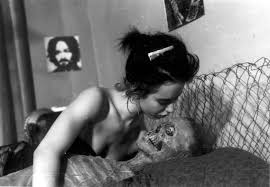OPEN WINDOWS
In an age when you can watch films on your phone, here’s another novelty – going to the cinema to see a film whose action takes place entirely on someone’s laptop screen. I think it did, anyway – I was frankly a little befuddled by the end. Bear in mind that I’m probably the only blogger who doesn’t have the internet.
Anyway from what I could make out, Elijah Wood plays a video blogger who becomes embroiled in internet supervillain Neil Maskell’s plot to kidnap an actress (Sasha Grey). New windows keep opening to signal yet another plot twist – some ridiculous French hackers appear, having mistaken Wood for an uber-hacker known as ‘Nevada’, who may or may not have been killed by Maskell, who can make lights in distant places go on and off and more or less control anything else that happens in the real world. Wherever that is.
Behind me I could hear someone sighing in exasperation as director Nacho Vilagondo’s stated determination to have something new happen every ten minutes bore fruit. I wasn’t sighing – but although I was engaged I wasn’t really involved. Vilagondo’s excellent Timecrimes, which I saw at Frightfest back in 2007, married cleverness to sly wit, and bore thinking about. This is diverting and technically a marvel but a somewhat inconsequential one. Well, that’s the internet for you I suppose. Dave didn’t have a clue what was going on, and enjoyed it.
NEKROMANTIK (1987)
From high-tech to decidedly low – director Jorg Buttgereit describes this as a ‘home movie’ and isn’t far off the mark. It was made on Super-8 at weekends in Berlin back when the Wall was still with us, and isn’t so much a horror movie as a tongue-in-cheek arthouse provocation and a bit of a lark.
Arthouse tag notwithstanding, the surprise is that this has a story – a love story yet. Our hero Robert (Daktari Lorenz) works for a street cleaning firm, which (since ‘street cleaning’ appears to be a euphemism for corpse disposal) allows him to bring body parts home for his girlfriend (Beatrice Manowski), who likes that sort of thing. One day, to her great delight, he gets hold of a whole decayed body and they take it to bed.
Then he loses his job. His girlfriend, conscious that he won’t be able to keep her (in bodies) anymore, dumps him. Going rapidly off the rails – not that he was ever exactly on them – he kills a cat, strangles a prostitute in cemetery, and decapitates a gravedigger. He is last seen stabbing himself in the stomach while ejaculating blood through a fake penis.
This was made with a conscious intention to outrage all decent-minded people, and was largely successful, except that hardly anybody saw it. Since then, commentators have discovered in it religious overtones, a parable about AIDS, and an excavation of Germany’s murky past. All of which is perfectly plausible, despite the fact that Buttgereit claims he never consciously meant any of it – it was all a happy accident. Similiarly, what was originally meant as a big fuck-you to society is now revealed as wholly life-affirming. In the subsequent Q&A, which goes on longer than the film did, the amiable Buttgereit confuses a ‘gravedigger’ with a ‘gardener’. This is very telling – in pursuing an interest in death about as far as it can go, Buttgereit has uncovered a lasting joie de vivre.
The film’s last shot is of the hero’s grave, and a high-heeled boot and a shovel planting themselves upon it. It seems that the stage is set for a reunion of the estranged lovers – a happy ending is a happy ending after all, however it is achieved.
Dave, whose tolerance for arthouse fare is low, enjoyed this more than I would have expected.
DER SAMURAI
Spurious connection time: Jorg Buttgereit credits John Waters’ Pink Flamingos for inspiration and there’s a pink flamingo (fake) in this. Also an erect penis (real). And Till Kleinert’s stylish and intriguing Der Samurai is a German film too. Did I say spurious? Perhaps not…
Jakob, a young smalltown policeman (Michael Diercks) isn’t taken seriously by the townsfolk and spends most of his time alone or playing cards with his Grandma (he has to explain the rules every time). His dull existence is interrupted by a sword-wielding madman in a dress (Pit Bukowski) who knows his name and is clearly another Bad Milo/Babadook, manifesting all the resentments and desires Jakob keeps scrupulously buttoned down (there is more than a hint that Jakob is gay).
As the maniac embarks on a destructive rampage our compromised hero tags along, making half-hearted attempts to stop him and at one point, goaded by the madman, attacking a pink flamingo lawn ornament. Pit Bukowski’s maniac is an athletic and believably feral eruption of animalistic energy, but although there are strong suggestions that he is a figment of Jakob’s imagination, he is also a real person, though one without a back story. This refusal to commit to one interpretation may be frustrating to some, but it lends the film a compelling mystery, chiming in with its fairy tale elements – the maniac is associated with wolves, and at one point pays a visit to Jakob’s Grandma. There is also unexpected poetry in the maniac’s excuse for beheading the townspeople (he is merely ‘uncorking’ them to let out their repressed desires).
This ‘uncorking’ becomes more than a metaphor at the film’s climax, where the film is at its gayest – in the best possible sense of that word. It wasn’t quite what Dave was expecting but he went along with it anyway.
And that was Frightfest.


Recent Comments